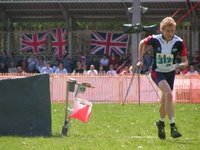There was an article in
The Times today that looked at preparations for the equestrian events at the
2012 Olympics. These will be held in
Greenwich Park, which is home to the Greenwich Royal Obervatory and also happens to have an orienteering map. It's not the most interesting park from an orienteering point of view, but it does have some contours and the views are truly spectacular.
The article discussed the planning for the cross-country stage of the three day event:
Benson, who rode competitively for 22 years, representing Great Britain in three European Championships, has established an outstanding reputation for fashioning courses and said that Greenwich is a “designer’s dream” because of the varied possibilities. “At this stage you have to have the imagination, thinking what you would have in a perfect world,” she said. “Then you have to be realistic.”
The complexity of laying out a cross-country course has meant that Benson has been appointed six years ahead of time. She can begin work on such ideas as whether it will be possible for the horses to go between the colonnades near Queen Anne’s house, or jump on and off the bandstand, and whether the Royal Parks will allow them to leap the hedges in the Rose Garden.
Paths will have to be covered, either by artificial or natural turf, and there is an existing pond for possible use as a water jump, one of the maximum of 45 jumping efforts that the horse has to make on the course of up to 6,270 metres. Always, Benson said, the horses’ benefit has to be a prime consideration. The hills must not be too steep for too long, the turns not too tight and obstacles must not be placed close to trees because the shadows could confuse the animals.
The comparison with the orienteering planning process struck me immediately. I then decided it would be interesting to see if we could run the Olympic three day event course as an orienteering race at some stage. And then I started thinking again about all the other opportunities that the Olympics will bring, even though there will clearly be no orienteering at the Games themselves. That doesn't stop us putting on events before and after to capitalise on the publicity and make use of some of the new facilities that will exist. Several of us in the South East have already been thinking about various ideas, but I'm not aware of any overall co-ordination yet. Maybe I need to suggest something to someone. Watch this space.
 Who is the only British orienteer to have been British M or W21 Champion at Long, Middle, Sprint and Night distances and also won the JK?
Who is the only British orienteer to have been British M or W21 Champion at Long, Middle, Sprint and Night distances and also won the JK?